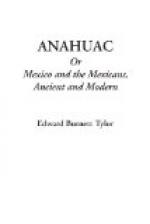Among the curious odds and ends which we came upon in Puebla, in the shop of a dealer in old iron and things in general, were two or three very curious old scourges, made of light iron chains with projecting points on the links—terrific instruments, once in very general use. Up to the present time, there are certain nights when penitents assemble in churches, in total darkness, and kneeling on the pavement, scourge themselves, while a monk in the pulpit screams out fierce exhortations to strike harder. The description carries us back at once to the Egyptian origin of this strange custom; and we think of the annual festival of Isis, where the multitudes scourged themselves in memory of the sufferings of Osiris. A story is told of a sceptical individual who got admission to this ceremony by making great professions of devotion, and did terrific execution on the backs of his kneeling fellow-penitents. Before he began, the place was resounding with doleful cries and groans; but he noticed that the cry which arose when he struck was not like these other sounds, but had quite a different accent. The practice of devotional scourging is still kept up in Rome, but in a very mild form, as it appears that the penitents keep their coats on, and only use a kind of miniature cat-o’-nine-tails of thin cord, with a morsel of lead at the end of each tail, and not such bloodthirsty implements as those we found at Puebla.
It seemed to us that the great influence of the priests in Mexico was among the women of all classes, the Indians, and the poorer and less educated half-castes. The men of the higher classes, especially the younger ones, did not appear to have much respect for the priests or for religion, and, indeed, seemed to be sceptical, after the manner of the French school of freethinking. It was quite curious to see the young dandies, dressed in their finest clothes, at the doors of the fashionable churches on Sunday morning. None of them seemed to go to mass, but they simply went to stare at the ladies, who, as they came out, had to run the gauntlet through a double line of these critical young gentlemen. As far as we could see, however, they did not mind being looked at. The poorer mestizos and Indians, on the other hand, are still zealous churchmen, and spend their time and money on masses and religious duties so perseveringly that one wishes they had a religion which was of some use to them. As it is, I cannot ascertain that Christianity has produced any improvement in the Mexican people. They no longer sacrifice and eat their enemies, it is true, but against this we must debit them with a great increase of dishonesty and general immorality, which will pretty well square the account.




